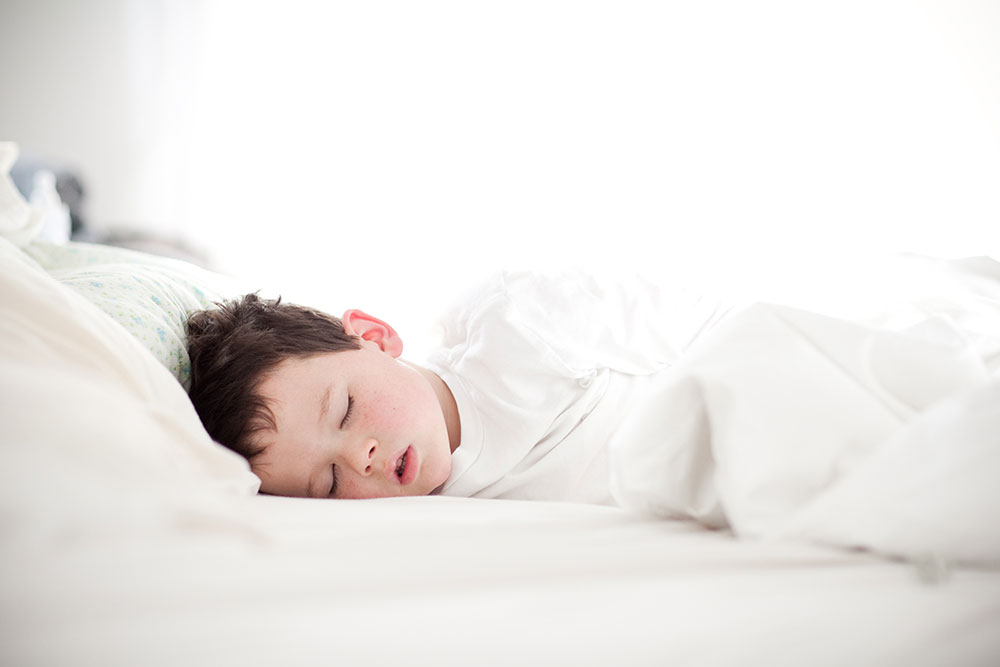How to Stop Children From Bedwetting

Overnight accidents are more common than you may realize.
Experts: Ari Brown, MD, FAAP; Jenelle Ferry, MD
For some kids, daytime potty training and overnight training go hand in hand, while for others, it’s a long process that leaves caregivers scratching their heads and feeling frustrated as they strip the bedsheets to start another load of laundry every morning. Why do nighttime accidents seem to linger well after some kids have ditched the diapers? And is there anything parents can do to help speed things along?
There are a lot of misconceptions when it comes to bedwetting in young children—particularly surrounding what’s considered normal and what signals a larger problem. To help break down everything parents need to know about bedwetting, we spoke with Ari Brown, MD, FAAP, a pediatrician practicing in Austin, Texas, a spokesperson for the American Academy of Pediatrics (AAP), and author of the Baby 411 book series and education brand, and Jenelle Ferry, MD, a neonatologist and director of feeding, nutrition, and infant development at Pediatrix Medical Group in Tampa, Florida.
What Causes Bedwetting?
There are a variety of reasons a child may be wetting the bed overnight, according to Dr. Ferry. In some cases, she says, it could be hereditary. “If parents, siblings, or other close family members experienced bedwetting, your child may be more likely to experience it as well.” Another possible reason a child may have nighttime accidents is simply because they are deep sleepers, and a full bladder isn’t enough to wake them up.
Dr. Brown says a small bladder capacity may also contribute to a child’s overnight accidents—especially when they typically sleep between nine to 12 hours at night. She adds, “ Some medical causes are related to delayed nighttime bladder control, including constipation and sleep disorders.”
More often than not, though, Dr. Brown and Dr. Ferry say bedwetting has to do with a child’s development. In fact, nighttime accidents can be very normal. “The bladder matures and becomes more relaxed for longer periods of sleep as a child gets older,” Dr. Ferry explains. If a caregiver doesn’t have a good understanding of what is considered normal development in this sense, then they may incorrectly assume that their child’s bedwetting is a problem.
At What Age Should a Child No Longer Be Wetting the Bed?
According to the AAP, the sweet spot for potty training is between 2 and 3 years old. However, this is really only for daytime toilet use. When it comes to overnight potty training, it is completely normal for children to continue to have accidents until they are around 5 years old—and even up to 7 years old.
“The medical term for bedwetting is nocturnal enuresis,” explains Dr. Ferry, “and is defined as wetting while asleep in children over 5 years old.” Even then, she says, “Most experts don’t recommend concern or evaluation for children under 7 years of age” who are having accidents in the middle of the night.
“A child should not be expected to be dry at night before they are ready,” stresses Dr. Brown. She further explains that a good sign that your child is capable of holding their bladder throughout the night is if they wake up dry every day for a month. “A majority of kids (around 85%) have accomplished this milestone by age 5,” she says, and “90% of children achieve nighttime training by age 7.”
What is the Treatment for Bedwetting?
Before reaching out for more specialized support, there are some things Dr. Brown and Dr. Ferry say caregivers can do at home to help set their child up for a dry night. First, try to help them develop smart fluid intake habits.
“Kids tend to drink a lot of their fluid from late afternoon to bedtime,” says Dr. Ferry, “Try to, instead, encourage more fluids earlier in the day and limit [the amount of fluid intake] two hours before bedtime.” She also suggests limiting caffeine, carbonated drinks, citrus juices, and sports drinks, as they “can irritate the bladder.”
According to Dr. Ferry, you can also help your child by encouraging them to use the bathroom every two to three hours throughout the day. Similarly, Dr. Brown says that having your child use the bathroom right before bedtime is a good idea.
For older children who are over 7 years old and who are motivated to stay dry overnight, Dr. Brown highly recommends using a bedwetting alarm. “Do a practice run right at bedtime of triggering the alarm and getting out of bed one last time to use the bathroom,” she says, “It works about 80% of the time after four weeks of use in a motivated child.”
No matter what, remember to be kind to your child throughout this process, and never shame them. “Parents can reassure their children that bedwetting can be a normal part of development and will likely get better with time,” says Dr. Ferry.
When to Seek Professional Help
Again, it’s important to remember that bedwetting is considered normal for school-aged children until they’re between 5 and 7 years old, so if your child hasn’t reached this age, professional intervention may not be warranted. However, Dr. Ferry notes, “If your child has previously achieved nighttime dryness and then starts bedwetting, discuss with your pediatrician.” Dr. Brown also recommends talking to the pediatrician if your child feels embarrassed and is really motivated to overcome the behavior.
You should also talk to the pediatrician if signs indicate the problem is physical rather than developmental. “Seek medical evaluation if, in addition to wetting, your child has pain with urination, often seems extra thirsty, has pink or red urine, has extra hard stools, or snores,” says Dr. Ferry, “These can be symptoms of other medical conditions that can have a side effect of increased urination and contribute to bedwetting.”
If you’re in the thick of it now and your child is under 7 years old, take comfort in knowing that this is still considered normal development. Go easy on yourself and your child, and encourage them to talk to you if they are feeling embarrassed so that you can work together to help set them up for success.








